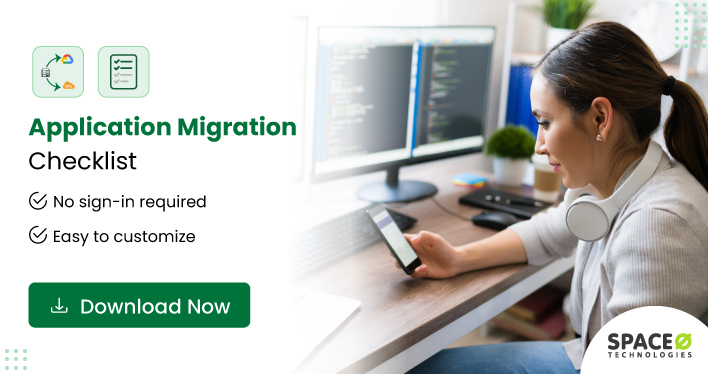Are you planning for application migration?
Have you got any idea what are the required steps for application migration?
If you are not aware, you can read our blog on mobile application migration.
We understand that application migration is a lengthy and complex process and so, you may need a checklist for hassle-free migration. Thus, we have come up with a compiled application migration checklist with phases essential for migration planning. Use the below checklist to ensure a successful migration.
Application Migration Checklist for Successful Migration
Here are the 9 phases of application migration below with a checklist for you to cross-check during the process.
1. Requirements Gathering
2. Assessing the Environment
3. Application Functionality Review
4. Architecture Analysis
5. Migration Resource Checklist
6. Technical Requirement
7. Test Planning
8. Compliances
9. Accessibility
The above migration process checklist will help you to shift your mobile application to the cloud easily. Ensure to bookmark [Ctrl+D] this page.
Requirements Gathering
The initial phase of the gathering starts with analyzing applications. Define app migration needs and requirements that give value to your business. Discuss the business goals and determine the application migration strategy. You should have the answers to how migration will fulfill customer needs, what would be significant, and what would be the total cost of the project. Understand the overall risk with the existing software applications and evaluate the project possibilities before starting the migration project.
Selecting the Migration Team and Methodology
Defining the scope
Outlining the goals
Assess the current systems
Evaluate the project possibilities
Review the scope and goals
Outline the process
Choose the points of contact
Assessing the Environment
You may want to consider the assessment of the entire process before taking it up to the new cloud environment. Choose the right hardware and platform for app development process. Overcome the networking issues, and assess the maintenance process post-development. A thorough assessment before the development will ensure successful adoption and improve productivity and efficiency.
Evaluate the systems
Analyze the entire process
Hardware and platform analysis
Software assessment
App development process
Maintenance and update
Network issues and bottlenecks
User interface updates needed
Application Functionality Review
To check the functionality of an application, you need to have knowledge of the workflow. Plan the workflow with the assistance of an app migration company or developers who understand the user flows. Get a detailed view of the application to decide on the source code. This will ensure that the code used for the application migration project is as per the business requirements.
Detailed view of the application
Knowing the user flows, and workflows
Source code analysis
Business logic analysis
Usage metrics
Architecture Analysis
Focus on defining the architecture techniques to use in the application migration process. It is the evaluation of how a proposed architecture is suitable for the business requirements. Architecture analysis is the backbone of the project. A set of technologies, operating systems, servers, and models based on the industry and business needs will enhance the development of the application. prepare documentation of the architecture analysis for better vision.
Security analysis procedures, policies, and restrictions
Control versions, processes, and development environment
Server, OS
Deployment processes in place
Operations and usage needs- bandwidth, memory
Documentation
Migration Resource Checklist
If you want to migrate your application to a new environment, you should follow the application migration checklist to ensure you have not missed out on any steps. Identify if you want to migrate your existing application or remove the app as a whole. Ensure that migrating will remove all the bugs and errors that you are facing with the existing application.
Timelines defined
Resources (Available and Needed)
Development
Problems needed to be solved
Alternative migration possibilities
Release dates for the different phases
Want to Create a Native or Hybrid App?
We are a leading app development company with a team of dedicated developers who can build various applications using the latest tools and technologies as per your app requirements.
Technical Requirement
Now that you have completed the architecture analysis, decide on the technical requirements for application modernization. If you need app migration, customize the app with database migration without any technical hitches. Partner with the best app development company to get skilled developers who have a wide range of experience in app migration.
Documentation standards
Technical – tools, platforms
Coding best practices
Problems needed to be solved
Architecture requirements
Test Planning
Without testing, launching any application is impossible. Testing the app will help you with reducing operational and maintenance costs, eliminate the risk in the business, enhance the application performance, and enhance technical support. Before migration, the testing team should create on-premise data and load it on the cloud to ensure it the working. Get real users to test the application and identify errors.
Test strategy
Test case development
QA planning
QA resource availability
Test case methodology
Testing documentation
Tools and procedures
Possible outcomes
Compliances
Check the security and compliance part of modernizing the application. Ensure to check the regulatory requirements are met. Migrating an app should meet all the security concerns like VPN, firewall, or database security.
Regulatory requirements
Compliance standards
Security policies
Accessibility
Moving your application to another platform can impact the performance if you are using the same data. Use strategies like offline copy migration, and replace data to avoid downtime. Master migration is a complex strategy to provide accessibility to the data. Documents with detailed commitments between the customers and app service providers will create and manage the services with ease.
Service level agreements
5 Strategies for Application Migration
Read the following to know more about strategies to follow during application migration. There are 5Rs to follow that will help you plan better if you want to shift applications to the cloud.
Re-host
In simple terms, this is copy-pasting the existing setup of the application to the cloud. This is also cost-efficient as you do not have to deal with operational or infrastructural costs.
Re-architect
If you want to boost agility, re-architect your existing applications and upgrade. It is nothing but transforming an application into a native cloud environment.
Revise
Revised architect is the strategy to modify the code before migrating applications. This is a critical part that involves technicalities. You will need the help of a technical in-house team but it is a time-consuming process.
Rebuild
Rebuilding an application from scratch is another strategy for application modernization. You should consider this strategy only when the application does not meet the changing needs of the business objectives.
Replace
This strategy discards an application if it does not suit the cloud environment. Use third-party applications to prevent loss of data due to replacing the application in a new environment.
If you are planning to perform application migration, you need to have this checklist beside you. Download our free application migration plan and get started with the checklist one by one. If you have any questions, contact us.





